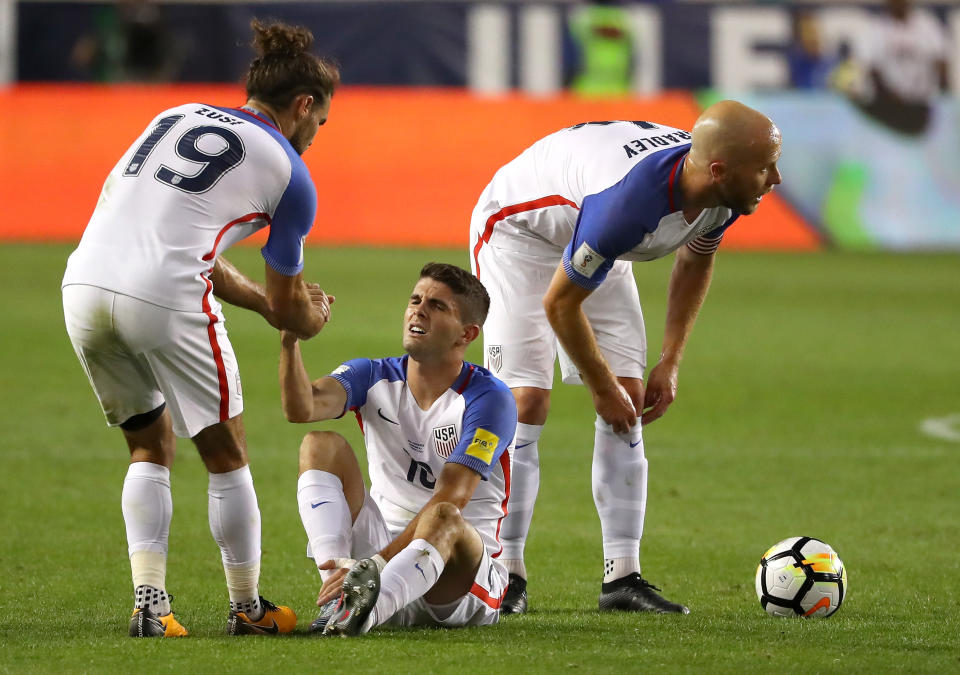For the first time in the modern era, expectations for the USMNT at the World Cup (?) are down
Jurgen Klinsmann laid down the objective just after the last World Cup. His United States men’s national team would aim to reach the semifinals of the 2018 edition, he proclaimed in Sept. 2014. He reiterated this goal in July of last year, four months before the German head coach would be fired.
Such an ambitious benchmark felt fanciful when Klinsmann first made it and ludicrous when he repeated it, with his job already in peril and the program mired in an unshakable mediocrity.
In almost a century of World Cup participation, the Americans have won just one knockout game in seven attempts. To reach the semifinal would require a victory in two of them.
Now, on the eve of a make-or-break week in which the USA will either reach an eighth straight World Cup, drop down to a playoff with Syria or Australia, or miss out altogether, sights have been lowered significantly. At this point, after the most chaotic American World Cup qualifying campaign in decades, a 2-3-3 record has made merely qualifying a triumph.
A win at home against Panama on Friday, another in Trinidad and Tobago on Tuesday and the Americans are off to Russia. If Panama retains third place and the U.S. holds off Honduras – which plays a much tougher slate against Mexico and Costa Rica – all is not lost. Failure to do either, with the Yanks slumping to fifth, and the soccer scene stateside will be thrown into a deep crisis.
But whatever the outcome, the program will have to hold itself to account for a difficult reality.
For the first time in, well, maybe ever, most informed fans won’t expect the U.S. to do better than in previous tournaments. Certainly, qualifying for the World Cup is pass/fail, as captain Michael Bradley once pointed out. And plenty of countries have labored to reach the big tournament, only to strike a rich vein of form at the right time.
An honest assessment of this team, however, suggests that’s unlikely.

Even after Bruce Arena came in and set about cleaning up the mess Klinsmann had made of a team that had no direction, identity or ideas, the issues that ran deeper remained. This team feels stuck between two generations, with the World Cup timed poorly, falling right in the crack between them.
After consecutive knockout round appearances at the 2010 and 2014 World Cups, both of which were lost in extra time of the round of 16, a third such run feels less likely than a group-stage elimination – to say nothing of a breakthrough march to the semifinals as envisioned by Klinsmann.
This is an unfamiliar predicament for a program that has slowly dug itself out a hole so deep in the late 1980s that the relentless ascent felt like a natural fact of life. The great irony of it all, of course, is that Klinsmann was supposed to drag the U.S. to an even higher level, while he actually caused the program to stagnate, or even regress.
The talk has always been about when the Yanks would be ready to truly contend for a World Cup — you’ll recall that Klinsmann was pilloried for declaring that the U.S. had no chance of winning the 2014 edition — rather than when they would trip up and miss an edition altogether. Or slip anonymously from the proceedings after just three games.
In hindsight, that probably wasn’t realistic. National team fortunes are cyclical. Even mighty Spain is prone to it. After winning Euro 2008, the 2010 World Cup and Euro 2012 back-to-back-to-back, La Furia Roja was bounced from the 2014 World Cup group stage.
The trick is for the peaks of the cycle to trend upwards, and the troughs to sink less deep.
If U.S. Soccer’s men’s program has indeed tumbled into a down-period, still reaching the World Cup could be considered a success. That feels like a letdown after 25 years of consistent improvement – the only real blip was the disappointing 2006 World Cup, because the 1998 team wasn’t equipped to reasonably be expected to do a whole lot more than it did. Maybe the program was overdue for it.
Realistically, there isn’t much to suggest that 2018 will be the USA’s year. Certainly, in Christian Pulisic, the program has its most promising player to ever come through the youth ranks; one who is already its best player. But he’ll still be 19, and can’t be expected to carry the team on his back. Yes, teenagers shone at World Cups before, but they had much more help than the Borussia Dortmund starlet likely will.
Chances are that the U.S. will be cannon fodder for bigger teams, whose generation timing has coincided better with this World Cup. Perhaps the draw will be of some help. The Americans got a brutal draw in 2014 but survived, and a helpful draw in 2010 when they only just squeaked through — so who knows?
There are those who argue that missing a World Cup might not be such a bad thing, because it would likely lead to a good shakeup of the ossified hierarchies at the federation. Regardless, in Russia next summer, the Americans will be widely expected by informed observers to do less well than they have in past tournaments.
If they even get there.
Leander Schaerlaeckens is a Yahoo Sports soccer columnist and a sports communication lecturer at Marist College. Follow him on Twitter @LeanderAlphabet.



